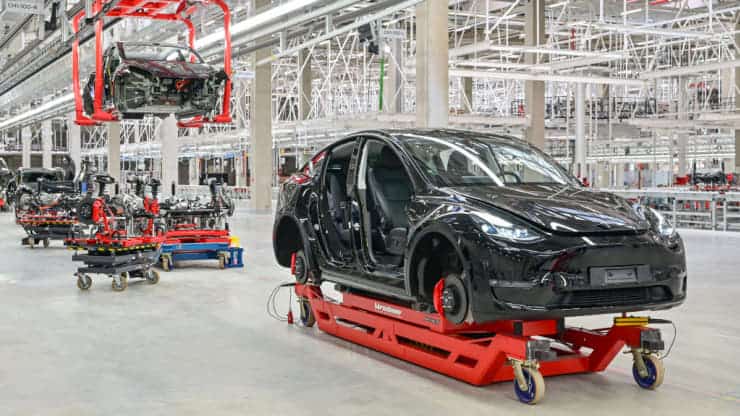
Tesla has gained approval to begin commercial production at its new factory near Berlin, local German officials announced Friday.
The conditional license for the vehicle and battery plants in Brandenburg was expected following months of delays. Tesla had intended to start production of vehicles by early summer of 2021, but the Covid pandemic, supply chain complications and clashes with environmentalists all slowed their pace.
The project, which was approved with a 536-page decision, includes the plant for the production of up to 500,000 vehicles per year, according to a translated release.
The approval does not mean Tesla can start production right away. The license is subject to a public objection period as well as other final inspection conditions that include air pollution control and water usage, according to the release.
The license came from the Brandenburg state environment office. Another translated release regarding the approval called the plant “a great success for Brandenburg.”
The German factory is extremely important to Tesla’s plans to expand globally following the opening of its Gigafactory 3 plant in Shanghai in late 2019. It’s expected to formally open a plant in Texas soon as well.
In November 2019, when Tesla CEO Elon Musk announced plans to build a car plant in Germany, he lauded German engineering. He said: “Everyone knows that German engineering is outstanding, for sure. That’s part of the reason why we are locating our Gigafactory Europe in Germany. We are also going to create an engineering and design center in Berlin, because Berlin has some of the best art in the world.”
While approval for the plant took longer than Tesla expected, local officials called the process “unusual in a number of ways.” That included the “comparatively short time” the State Office for the Environment “inspected and approved not just a factory, but an entire industrial area with several large-scale plants and repeated public participation,” officials said.
In 2020, Tesla capitulated to activists’ demands and agreed to reduce water consumption at its new plant by more than a third. The company also had to temporarily suspend its construction schedule that year, specifically the clearing of a pine forest, so it could prove the action would not harm hibernating snakes and lizards in the area.
Tesla still faces hurdles around its water utility contract in Brandenburg.
On Friday, local environmental advocates are expected to argue in an administrative court hearing that the Brandenburg environmental ministry did not conduct adequate reviews before giving a license to the local water utility to fulfill a contract with Tesla.
Reuters reported that the groups bringing the complaint claim the factory would use enough water to support a 30,000-person town.
If the environmental groups win, Tesla will need to wait for the water utility to negotiate with local authorities over where they can source the volume of water needed to run Tesla’s new factory.
In recent years, Tesla has been selling into the region, and competing against European automakers like Volkswagen and Audi, by exporting vehicles from its plant in Shanghai.
According to Canalys research, 6.5 million electric vehicles (including 4.5 million battery-electric vehicles) were sold worldwide in 2021. In Europe last year, 2.3 million electric vehicles were sold accounting for 19% of all new cars. Just over half of those, or 54% of all new electric vehicle sales in Europe, were battery-electric vehicles like those made by Tesla.
























